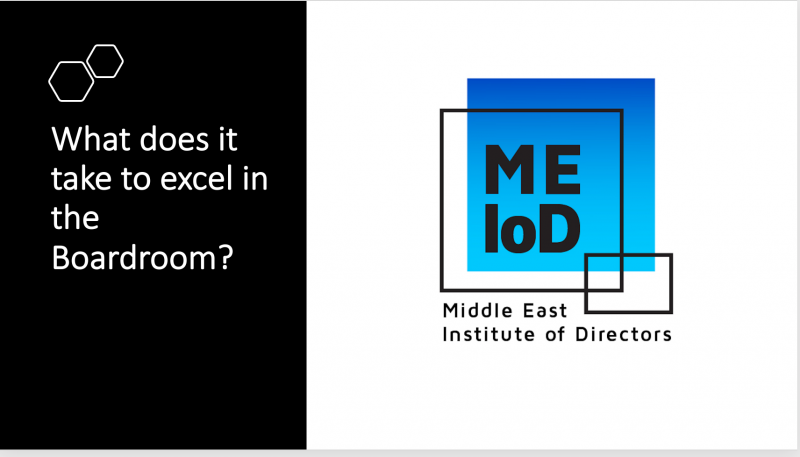What does it take to excel in the boardroom

What does it take to excel in the boardroom
What makes a successful board member? In this article we look at the qualities, qualifications and experience that help both current and prospective board members excel in their role.
Every board is as unique as its directors, but in our experience working with a range of organizations across different industries and sectors, there are certain features that the most successful and effective boards share.
When we think about appointing a board, the first qualifications that come to mind for potential directors are their expertise and experience, and without a doubt, these are extremely valuable indicators.
But looking beyond the facts listed on a resume, there are other qualities that predict success, on a personal, professional, and organizational level.
It’s far easier to be an effective board member when you have a genuine passion for the company’s purpose, vision and mission. If you’re looking for board vacancies, or find yourself choosing between several potential positions, the company which excites and interests you the most is often the best bet.
You should be serious about service, that is, you should take the responsibilities of your role seriously, and endeavor to discharge them to the best of your ability. It’s vital that each member of the board understands their role, their responsibilities, and their legal obligations as they pertain to the board, shareholders, and the wider organization.
Unnecessary negativity can hamper the effectiveness of a board. Yes, it’s part of your role to hold the CEO and management to account, but you’re all on the same team, so any criticism should be constructive and delivered neutrally and professionally.
Equally, too much positivity is a bad thing - no board survives if all its seats are filled by “yes-people”. A good board member should be supportive, but not sycophantic.
However, excellent personal qualities and extensive experience on their own do not make the ideal board member - in fact, those members who feel they are already the “complete package” upon appointment to a directorship are probably misguided.
And it’s important to remember that board membership is not a static position - to be effective, it’s necessary to grow and evolve in the role. To ensure continued success, it’s important to be a lifelong learner.
A crucial part of this is ensuring that you stay up-to-date with the latest environmental, social, and governance (ESG) best practices, and are able to assess the position of the company in relation to ESG and make informed suggestions.
As well as a commitment to your own responsibilities as a board member, to truly excel, you need to be committed to your colleagues on the board, and within the wider organization.
You should be well connected, both externally and internally, developing and maintaining excellent relationships with key people within the organization and networking with industry influencers, allowing you to offer relevant insights and advice.
The most effective board members are generous with their time, seeking out opportunities to mentor and coach executives, either on a formal or informal basis, sharing the benefit of their knowledge and experience, and nurturing talent.
Perhaps most importantly though, the whole purpose of a board is to bring together individuals with a range of different expertise, experience, and skills, which together create strength and purpose.
There’s no set of traits that make up the “perfect” board member - an effective board results from how well it is composed.
The ideal board is greater than the sum of its parts, and to excel as an individual it’s necessary both to know and understand your place within the structure and understand how that structure works as a whole. While individual talents are an important part of that, there’s no “star player” effect - it’s a team effort.
So, as a current or prospective board member, a useful habit is to ask yourself regularly how you can improve, within a personal, professional, or organizational context, to add more to the overall output and success of your board and take the necessary steps to develop in that direction.
For those of you looking for your first board position, it may be worth looking at MEIoD’s newly launched Board Ready Program that helps you better understand your board value proposition and how you can find the most suitable board role. You can find out more about the program here.
Alternatively, MEIoD’s Corporate Directors Program might be what you need. On successful completion of the CDP, graduates become eligible for nomination to board positions. You can find out more about the program here.
For More Information:
advisoryServices | webinars | knowledgeCenter | Capacity Building | A-Look-At-Corporate-Governance-In-The-Context-Of-COVID-19 | Is-it-acceptable-for-a-CEO-to-also-be-Chairperson | 5-ESG-trends-that-should-be-on-your-radar | Corporate-culture-and-the-role-of-the-board | The-key-drivers-of-effective-corporate-governance | Which-type-of-board-structure-does-my-business-need | The-Importance-of-a-Code-of-Ethics-in-an-Organization | reducing-the-pressure-to-decide-in-the-boardroom | How-future-proof-is-your-board | How-do-you-tell-if-someone-is-qualified-to-sit-in-the-boardroom | What’s-your-position--what’s-your-heading—leading-vs-lagging-indicators | The-value-of-governance-for-SMEs | Getting-started-with-governance:-a-guide-for-SMEs | What’s-on-the-boardroom-agenda-in-2021 | Role-of-CFO-in-the-boardroom | The-Shape-of-Corporate-Governance-in-2023 | Updates-on-Corporate-Governance-in-the-Middle-East-–-April-2023 | 3-ways-that-corporate-governance-is-crucial-to-sustaining-family-businesses | How-governance-legislation-in-Abu-Dhabi-has-affected-family-owned-businesses | Boards-of-Directors-in-the-GCC:-Navigating-the-Aging-Boards-Issue | Board-Composition-Trends-in-GCC | Politics-in-the-Boardroom:-Navigating-Power-Dynamics-and-Decision-Making | Why-Startups-Need-Independent-Directors:-The-Key-to-Good-Governance-2 | The-role-of-the-chairperson-2 | How-board-remuneration-impacts-company-success-2 | The-value-of-a-family-constitution-for-family-owned-businesses-2 | 6-questions-board-members-should-be-asking-themselves-2 | Case-Study:-Lessons-from-a-Failed-Digital-Transformation-Implementation | 8-ways-boards-can-drive-effective-corporate-governance | How-committees-and-boards-interact-4 | Importance-of-Training-for-Directors | Advancing-Digital-Transformation-and-Cybersecurity-Governance-in-the-Middle-East | Strengthening-Stakeholder-Engagement-and-Communication-Across-the-GCC:-The-Critical-Role-of-Boards-in-Navigating-Shareholder-Activism | about | investors | director-nomination | corporate-governance-reporting | corporate-governance-assessment | 1-to-1-coaching-for-board-members | advisory-board-setup | board-evaluation | family | director-nomination | corporate-secretarial-services | corporate-governance-assessment | 1-to-1-coaching-for-board-members | board-evaluation | corporate-governance-reporting | individuals | director-nomination | 1-to-1-coaching-for-board-members | entrepreneurs | corporate-secretarial-services | corporate-governance-reporting | corporate-governance-assessment | 1-to-1-coaching-for-board-members | board-evaluation | advisory-board-setup | director-nomination
Share article




